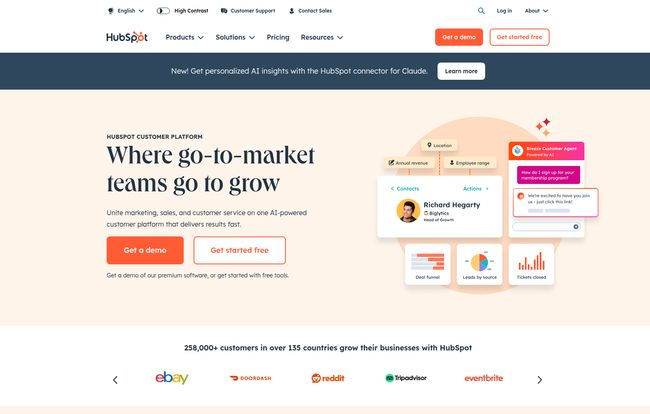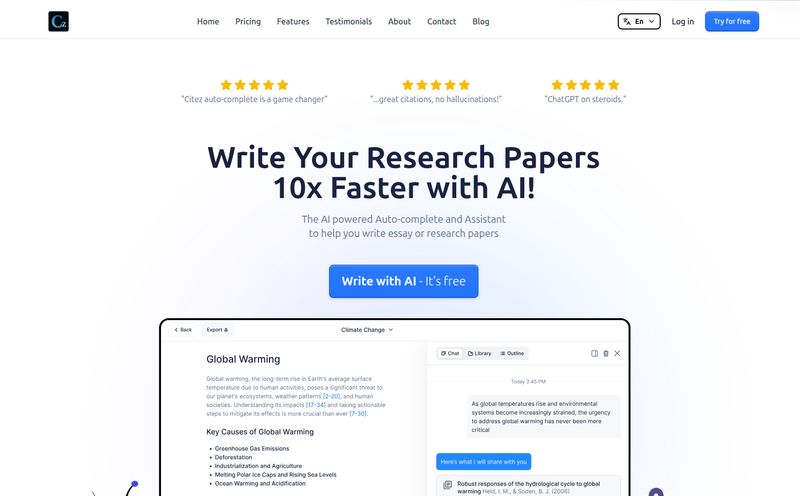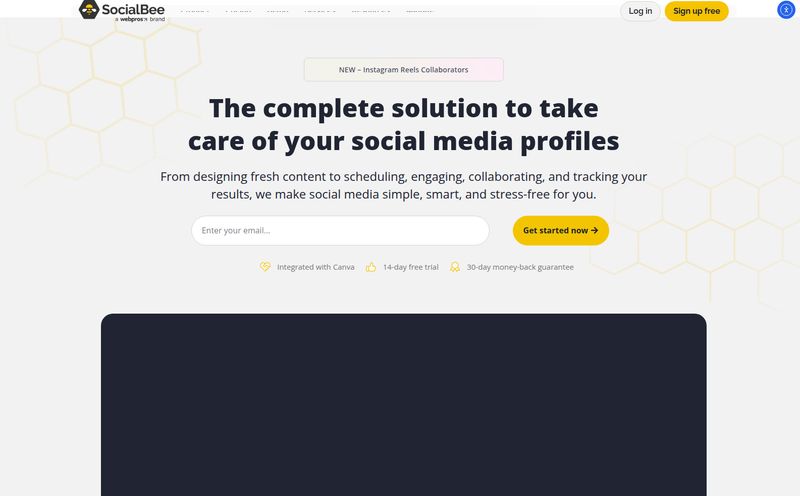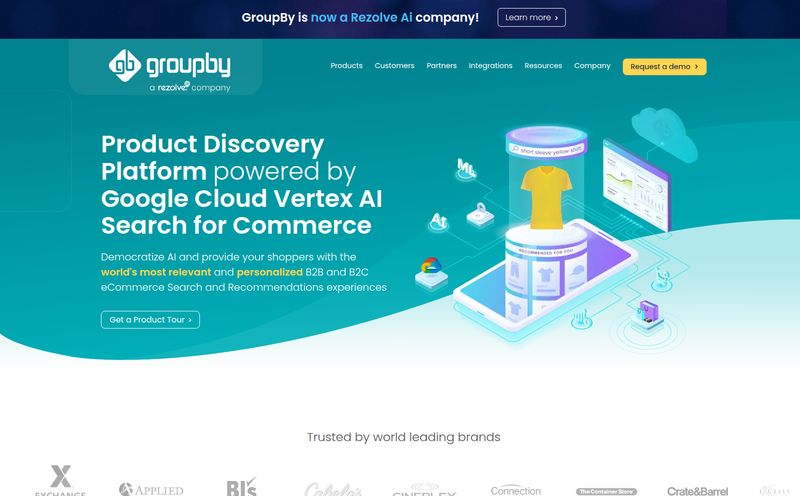The marketing tech stack for most businesses looks like a tangled mess of Christmas lights. You’ve got one tool for email, another for social scheduling, a different one for your CRM, and three others that you signed up for on a whim and now just pay for every month. It’s a nightmare. I’ve been there, pulling my hair out trying to get two platforms to talk to each other. So when a tool comes along promising to put everything under one roof, my ears perk up. But I’m also skeptical.
Enter HubSpot. You've heard the name. They've been a giant in the marketing and sales world for years. But recently, they've been making a lot of noise about being an “AI-powered customer platform.” And with the whole world going crazy for AI, you have to wonder: is it just marketing fluff, or is there some real fire behind all that smoke? I've spent years in the trenches of SEO and traffic generation, and I've seen platforms come and go. So, I decided to take a fresh, hard look at what HubSpot is serving up today.

Visit HubSpot
So, What is HubSpot Anyway?
Okay, the corporate line is that HubSpot is a “customer relationship management (CRM) platform that combines marketing, sales, customer service, content management, and operations software.” That’s a mouthful, right? Let me translate. Think of HubSpot not as a single tool, but as a massive toolbox. Or maybe a better analogy is a Swiss Army knife for your entire business. It has a specific attachment for almost every task you need to do to attract visitors, nurture leads, and keep your current customers happy.
At its core is the HubSpot CRM, which is, and this is a big deal, completely free. This isn't some watered-down trial version either. It's a genuinely powerful tool for organizing all your contacts and tracking every interaction. This is the foundation. From there, you can start bolting on different specialized modules, which they call “Hubs.” It's this modular approach that makes it scalable, but as we’ll see, can also make it a little… intimidating.
A Quick Tour of the HubSpot Ecosystem
To really get it, you need to understand the different parts. Each Hub is designed for a specific team, but the real magic happens when they work together, sharing data and giving you a complete picture of your customer’s experience.
The Marketing Hub
This is where it all started for HubSpot and probably what they're most famous for. The Marketing Hub is all about getting your business found. It includes tools for things like email marketing, building landing pages, managing your social media, blogging, and SEO. It's built on the philosophy of inbound marketing – creating valuable content that pulls people in. If your job is to generate leads, this is your playground.
The Sales Hub
Once Marketing has brought the leads in, the Sales Hub helps your team close the deal. This part of the platform is packed with tools to make a salesperson’s life easier. Think email templates and tracking, meeting scheduling, sales automation (so you can follow up without thinking), and detailed reporting to see what’s working. It’s all about efficiency and giving your sales team more time to actually sell.
The Service Hub
You’ve got the customer, now you have to keep them. The Service Hub is designed for your customer support team. It includes a ticketing system to manage support requests, a knowledge base builder so customers can help themselves, and tools for collecting feedback like Net Promoter Score (NPS) surveys. A happy customer is a repeat customer, and this Hub is all about making that happen.
The Supporting Cast: Content, Operations, and Commerce Hubs
Beyond the big three, there are a few other players. The Content Hub helps you manage and optimize all your content marketing efforts. The Operations Hub is the real unsung hero, in my opinion. It's the engine that keeps everything in sync. It helps you clean up your data, automate internal processes, and connect HubSpot to your other business tools. It's the glue. Finally, the newer Commerce Hub is geared towards B2B businesses, helping manage payments and subscriptions directly within the platform.
The AI Elephant in the Room: Let's Talk Breeze
Alright, let’s get to the shiny new stuff. HubSpot is betting big on AI, and they've branded it “Breeze.” They’re rolling out AI-powered assistants they call “agents” to help with specific tasks. You’ve got a Customer Agent to help with support, a Prospecting Agent to help sales find new leads, and a Content Agent to help marketers brainstorm and create copy. This is pretty cool stuff. The idea of an AI assistant that can take over repetitive tasks is the dream, right?
However, and this is important, some of these features are still in beta. That means they're not fully baked yet. I’ve also seen that the AI is primarily optimized for English right now, which is a big consideration for international teams. It's exciting, for sure, but it’s still early days. I see huge potential here, especially for small teams who need an extra pair of hands, but it’s wise to go in with realistic expectations.
The Million-Dollar Question: What's the Price Tag?
This is where things can get a bit tricky. HubSpot’s pricing can feel as complex as the platform itself. The good news is you can start for free with the CRM and a bunch of basic tools. This is a fantastic way to get your feet wet. But once you need more power, you have to upgrade to their paid plans, and the price can jump significantly.
Let's just look at the Marketing Hub as an example. The pricing structure generally looks something like this:
| Plan | Starting Price (per month) | Best For |
|---|---|---|
| Marketing Hub Starter | ~$18 | Individuals or very small teams just starting out. |
| Marketing Hub Professional | ~$800 | Growing businesses that need serious marketing automation and reporting. |
| Marketing Hub Enterprise | ~$3,600 | Large companies with multiple teams and complex needs. |
Note: These prices are estimates and can change based on features and number of contacts. Always check the official HubSpot pricing page for the most current information.
Yes, that jump from Starter to Professional is steep. It's one of the most common complaints you'll hear about HubSpot. But you have to weigh the cost against the value of having everything integrated. How much are you paying for all those separate tools right now? Sometimes, the all-in-one price, while high, can actually be a saving. It just requires doing the math for your specific situation.
My Honest Take: The Good, The Bad, and The Overwhelming
So, after all that, is HubSpot the right choice? The honest answer is: it depends.
The biggest pro is undeniably the all-in-one integration. When your marketing, sales, and service data all live in the same place, you can do some incredibly powerful things. The insights you get are on a whole other level compared to trying to stitch together reports from five different platforms. The free CRM is also a massive win and makes it a no-brainer to at least try out. And with over 1,800 apps in their marketplace, you can connect it to almost anything else you're using.
On the flip side, the platform can be genuinely overwhelming. When you first log in, it feels like you've been handed the keys to a space shuttle. There are menus within menus, and a ton of features you may never even touch. It takes a real commitment to learn. And as mentioned, the price for the premium plans is not for the faint of heart. It's a serious investment.
In my experience, the businesses that succeed with HubSpot are the ones that go in with a clear plan. They don't try to boil the ocean on day one. They start with the free CRM. They master one Hub, maybe the Marketing Hub, and then gradually expand as their needs and budget grow. Trying to implement everything at once is a recipe for disaster.
Frequently Asked Questions about HubSpot
Can I really use HubSpot for free forever?
Yes, the HubSpot CRM is free forever. It also comes with a selection of free tools from the Marketing, Sales, and Service Hubs. These have limitations, of course, but they are very functional and a great starting point for any business.
Is HubSpot only for big companies?
Not at all. While their Enterprise plans are for large corporations, the free tools and the Starter plans are specifically designed for small businesses and startups. It’s a platform that can grow with you, which is one of its main strengths.
How hard is it to learn HubSpot?
I won’t sugarcoat it, there's a learning curve, especially for the more advanced features. However, HubSpot has one of the best educational resources out there with the HubSpot Academy. They offer tons of free courses and certifications to help you get up to speed.
Do I need to buy all the Hubs?
No, you can buy them individually. You can start with just the Marketing Hub, for example, and run your business perfectly fine. You only add other Hubs if and when you need the specific functionality they offer.
Is the AI in HubSpot actually useful?
It's becoming more useful every day. For things like writing a first draft of an email, coming up with blog ideas, or creating reports, it's a real time-saver. As the technology matures, I expect it to become an indispensable part of the platform.
Is HubSpot worth the money?
If you're going to use its features, yes. If you’re paying for the Professional plan but only using it to send a monthly newsletter, then no, it's not worth it. The value comes from integration and automation. If you leverage that, the ROI can be massive, as their own customer stats show.
Final Thoughts
Look, HubSpot isn't a magic wand that will instantly solve all your business problems. It's a powerful, complex, and sometimes costly platform. But it's also one of the most comprehensive and well-integrated solutions on the market. The move towards AI shows they aren't resting on their laurels, which is a good sign.
My advice? Start small. Sign up for the free CRM. Poke around. Watch a few HubSpot Academy videos. See if the way it “thinks” feels right for your business. If it does, then you can start considering one of the paid plans. It might just be the thing that finally lets you throw out those tangled Christmas lights of a tech stack for good.
References and Sources
- HubSpot Official Website: https://www.hubspot.com/
- HubSpot Marketing Hub Pricing: https://www.hubspot.com/pricing/marketing



